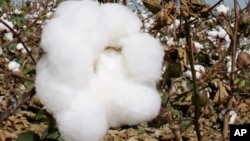Nearly three years after an explosion on the Deepwater Horizon oil rig spilled nearly 5 million barrels of crude into the Gulf of Mexico, oil is still being found on Gulf beaches and coastal marshes. Officials have used everything from straw, to wool, to feathers to try to soak it up.
Now, scientists at Texas Tech University report that unprocessed raw cotton may provide the ideal clean-up solution for crude oil spills.
Seshadri Ramkumar and his colleagues studied the properties of low micronaire cotton, a poor quality fiber that does not hold dye well and has little commercial value for textiles. They found it could absorb and hold more than 30 times its weight in crude oil, and its natural waxiness keeps water out. "In contrast to synthetic sorbents," Ramkumar says, those properties make this type of cotton "an ecologically-friendly sorbent for oil spill cleanups."
The study is one of the first to provide scientific data on raw cotton's use in crude oil spills. Published by the American Chemical Society (Industrial & Engineering Chemistry Research), it was funded in part by the industry group, Cotton Incorporated.
Now, scientists at Texas Tech University report that unprocessed raw cotton may provide the ideal clean-up solution for crude oil spills.
Seshadri Ramkumar and his colleagues studied the properties of low micronaire cotton, a poor quality fiber that does not hold dye well and has little commercial value for textiles. They found it could absorb and hold more than 30 times its weight in crude oil, and its natural waxiness keeps water out. "In contrast to synthetic sorbents," Ramkumar says, those properties make this type of cotton "an ecologically-friendly sorbent for oil spill cleanups."
The study is one of the first to provide scientific data on raw cotton's use in crude oil spills. Published by the American Chemical Society (Industrial & Engineering Chemistry Research), it was funded in part by the industry group, Cotton Incorporated.









